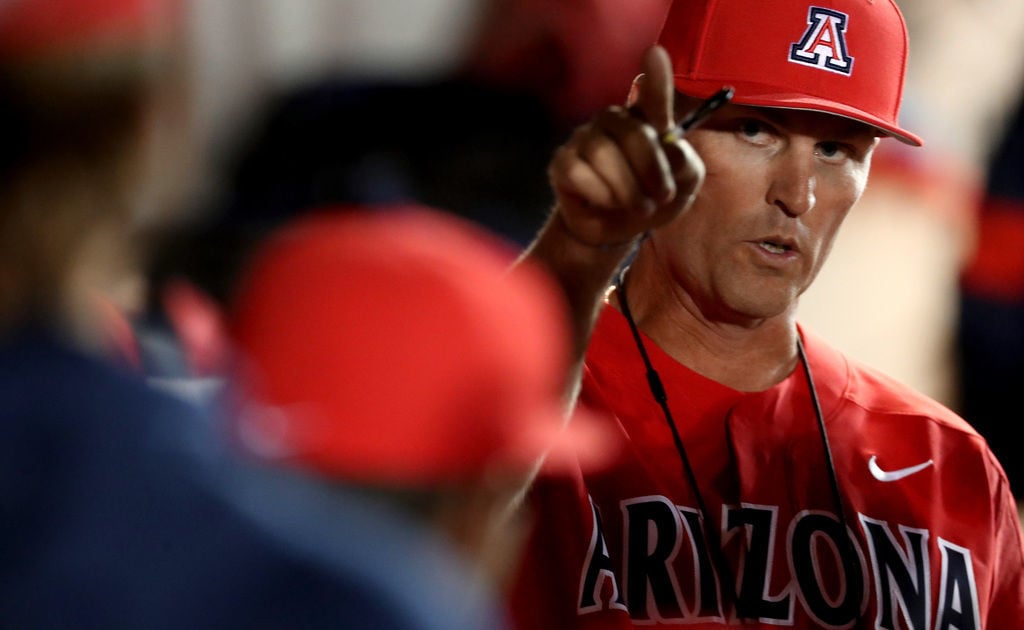It’s early.
The Arizona Wildcats are only four games into a 56-game regular season. It would be irresponsible to draw any conclusions about anything — especially a pitching staff that was wildly inconsistent a year ago.
But pitching has been the focal point for the program since last summer, when Jay Johnson implemented a plan to fix things. After his team fell just short of the NCAA Tournament for a second straight year — mainly because of subpar pitching — Johnson hired Nate Yeskie from Oregon State, which has been the Pac-12’s flagship program.
Since then, Arizona’s new pitching coach has been the most-talked-about Wildcat, or at least a close second behind star catcher Austin Wells. What changes would Yeskie implement? What’s it like to work with him? How big of a difference could he make?
Again, it’s early. But with a handful of precincts reporting, the results look promising. Johnson is seeing what he hoped to see.
“I want to build a culture on the pitching staff that resembles the culture of the position players in terms of confidence and aggressiveness and attention to detail,” said the fifth-year coach, whose team faces Southern Illinois on Friday in the Tony Gwynn Legacy Tournament in San Diego.
“He’s doing a really good job of that. He’s got a great track record that commands respect. Our players have responded well to that.”
The caliber of competition and small sample size must be taken into account, but here are some of the key numbers:
In 2019, Arizona had a 6.21 ERA, a 1.75 WHIP and a 1.41 strikeout-to-walk ratio. Thus far in 2020, those numbers are 3.00, 1.17 and 3.18.
Last year, the Wildcats allowed fewer than four runs in only one of their first 17 games. This year, they already have done that twice.
“Much better,” Johnson said of the pitching so far — after a 5-2 loss to Minnesota on Monday. “I’m very excited about the direction of that.”
Having battled him the previous four seasons, Johnson had the utmost confidence in Yeskie — to the point that the head coach entrusted the entire pitching operation to his new aide. The staff collaboratively formulates a pregame plan, but Yeskie — who coached at OSU for 11 seasons and helped the Beavers win the 2018 College World Series — is the one who makes the mound visits and the pitching changes.
Opening-night starter Garrett Irvin, another newcomer, was the recipient of a pair of visits from Yeskie during his UA debut. One of the trips followed a sequence that saw an Albany batter foul off several two-strike pitches.
“I’m just giving you a breather,” Yeskie told Irvin, per the pitcher’s retelling.
The visit illustrated Yeskie’s feel for the game and helped calm Irvin down. The junior-college transfer made it through five innings to earn his first Arizona victory.
How else has Yeskie helped the pitching staff? The theme his pupils mention the most is accountability. Yeskie demanded a lot of them when fall practice began, and he hasn’t let up.
“We’ve just gotta be men and treat every day like we’re men,” senior right-hander Preston Price said. “You can’t let any day go by. Life is too fast. Baseball is not promised for everybody.
“You only make it as far as you put the work in. So if you don’t put the work in, and if you aren’t doing everything you can to win, then you’re gonna be left behind.”
Price earned Arizona’s Summer Pitcher of the Year award in 2018 after going 3-2 with a 3.07 ERA for the Anchorage Bucs of the Alaska Baseball League. He never found a groove the following season, posting an 8.31 ERA in 13 appearances.
Price has looked like a closer candidate so far this year. He has been the last pitcher out of the pen the past two games, yielding two hits and no runs in 2ª innings. Price has struck out four batters with a potent slider without issuing a walk.
Price is using his legs more when delivering the ball, but he gave most of the credit for his improved performance to Yeskie and undergraduate assistant Cameron Ming. Price has benefited greatly from Yeskie’s visualization techniques — picturing the pitch after getting the sign. Ming was Price’s teammate in 2017 and brings the perspective of a player with recent college and pro experience.
With their help, Price said, “it’s a different me, and I feel good about it.”
Yeskie also stresses the importance of sticking to a routine — but tailors each pitcher’s regimen to his individual needs.
“He does a really good job of personalizing each guy’s program,” said veteran right-hander Quinn Flanagan, who threw seven shutout innings last Saturday. “One thing might work for one guy; another thing might work for another guy.”
Overall, Yeskie has instilled a sense of ownership that might have been lacking in previous years. Regardless of what the offense does, the pitching staff has to carry its weight.
You’ve heard of FIP — fielding independent pitching? Yeskie is an advocate of HIP — hitting independent pitching.
“It doesn’t really matter what’s going on offensively,” Flanagan said. “We’re going to try to be the best pitching staff we can be.”
Inside pitch
• Arizona has not named starting pitchers for the weekend.
• Arizona’s opponents in the Tony Gwynn Legacy Tournament — Southern Illinois, Iowa and Nebraska — have a combined record of 6-5. None is more than one game above or below .500.
• When Matthew Dyer went 0 for 5 Monday, he snapped a 23-game on-base streak dating to last season. “Matt’s a really good hitter,” Johnson said. “He just got out of himself and out of his zone discipline a little bit. Friday, I bet he puts together five really good at-bats.”





